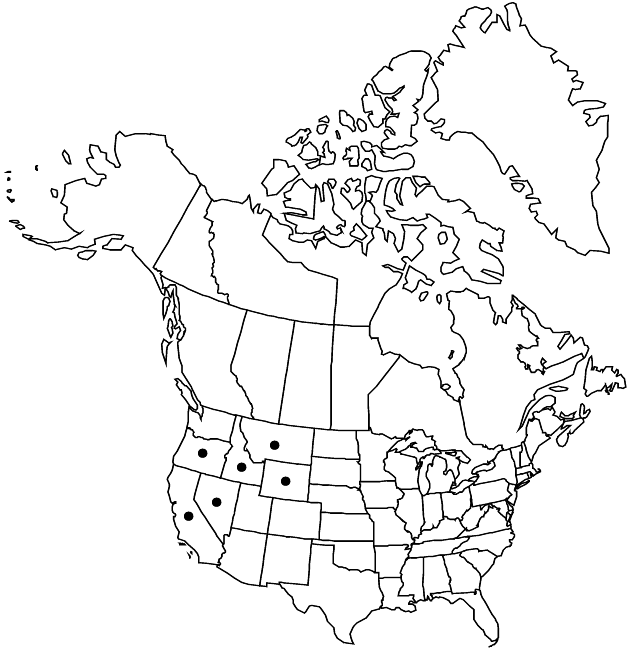Difference between revisions of "Cirsium cymosum var. canovirens"
Sida 21: 212. 2004.
Common names: Graygreen thistle
Basionym: Carduus canovirens Rydberg
Synonyms: Cirsium canovirens (Rydberg) Petrak
Treatment appears in FNA Volume 19. Treatment on page 136.
FNA>Volume Importer |
FNA>Volume Importer |
||
| Line 30: | Line 30: | ||
|elevation=600–2600 m | |elevation=600–2600 m | ||
|distribution=Calif.;Idaho;Mont.;Nev.;Oreg.;Wyo. | |distribution=Calif.;Idaho;Mont.;Nev.;Oreg.;Wyo. | ||
| − | |discussion=<p>Variety canovirens occurs from the dry mountains and valleys of eastern Oregon and the rain shadow slopes of the northern Sierra Nevada eastward across the northern Great Basin to Idaho, southern Montana, and western Wyoming. D. J. Keil and C. E. Turner (1993) recognized a polymorphic Cirsium canovirens that included C. subniveum (here treated as C. inamoenum). My subsequent investigations indicate that the merger of those taxa was erroneous, based in part on mis-identified specimens.</p> | + | |discussion=<p>Variety canovirens occurs from the dry mountains and valleys of eastern Oregon and the rain shadow slopes of the northern Sierra <i>Nevada</i> eastward across the northern Great Basin to Idaho, southern Montana, and western Wyoming. D. J. Keil and C. E. Turner (1993) recognized a polymorphic <i>Cirsium</i> canovirens that included C. subniveum (here treated as <i>C. inamoenum</i>). My subsequent investigations indicate that the merger of those taxa was erroneous, based in part on mis-identified specimens.</p> |
|tables= | |tables= | ||
|references= | |references= | ||
| Line 54: | Line 54: | ||
|publication year=2004 | |publication year=2004 | ||
|special status= | |special status= | ||
| − | |source xml=https://jpend@bitbucket.org/aafc-mbb/fna-data-curation.git/src/ | + | |source xml=https://jpend@bitbucket.org/aafc-mbb/fna-data-curation.git/src/8f726806613d60c220dc4493de13607dd3150896/coarse_grained_fna_xml/V19-20-21/V19_113.xml |
|tribe=Asteraceae tribe Cardueae | |tribe=Asteraceae tribe Cardueae | ||
|genus=Cirsium | |genus=Cirsium | ||
Revision as of 15:09, 18 September 2019
Larger heads 15–25 mm diam. Outer phyllaries usually much shorter than inner; glutinous ridge prominent, well developed, appearing dark brown on dry specimens. 2n = 34 (as C. canovirens).
Phenology: Flowering spring–summer (Apr–Aug).
Habitat: Grasslands, sagebrush steppe, pinyon-juniper woodlands, dry coniferous forests, roadsides
Elevation: 600–2600 m
Distribution

Calif., Idaho, Mont., Nev., Oreg., Wyo.
Discussion
Variety canovirens occurs from the dry mountains and valleys of eastern Oregon and the rain shadow slopes of the northern Sierra Nevada eastward across the northern Great Basin to Idaho, southern Montana, and western Wyoming. D. J. Keil and C. E. Turner (1993) recognized a polymorphic Cirsium canovirens that included C. subniveum (here treated as C. inamoenum). My subsequent investigations indicate that the merger of those taxa was erroneous, based in part on mis-identified specimens.
Selected References
None.
Lower Taxa
None.